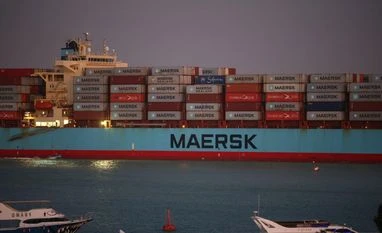Maersk expects global demand for container shipping to grow more slowly in the next few quarters as market risks persist while the group's capital expenditure is set to grow faster, it said on Wednesday, sending the company's shares down.
The Danish shipping group is in the process of signing orders for 50 to 60 new container vessels for delivery from 2026 to 2030 as part of its fleet renewal, replacing older vessels to keep its overall transport capacity steady, it said.
The company's fleet, which includes a significant number of chartered vessels, consists of more than 700 container ships, Maersk has said.
The ramped-up fleet renewal programme will boost Maersk's capital expenditure for the 2024-2025 period by $1 billion to a range of $10 billion to $11 billion compared to the company's previous guidance of $9 billion-$10 billion, it said.
The company's share price fell 2.4% by 0823 GMT, taking its year-to-date decline to 11.4%
More than 60% of the new vessels ordered under the Maersk fleet renewal will be chartered from other owners while the remainder will be owned by the group itself, the company said.
More From This Section
Maersk, viewed as a barometer of world trade, said global container demand was estimated to have grown 5%-7% in the second quarter, boosted by a 10% jump in Chinese exports on the year, among other factors.
"Global container demand growth is expected to remain positive in coming quarters, but likely at a slower pace," the company said in its earnings report.
Maersk also confirmed preliminary second-quarter earnings released last week, when it raised its outlook for the third time since May, citing higher freight rates due to the Red Sea crisis and solid container shipping demand.
Maersk last week cautioned that prospects for the fourth quarter were uncertain.
"A healthy, albeit cooling labour market, and wage gains are expected to continue to support U.S. consumers. Declining consumer confidence and savings, however, are clouds at the horizon," Maersk said on Wednesday.
For the full year, it expects global container market volumes to increase by 4-6%.
Shipping disruptions caused by Houthi militants' attacks on vessels in the Red Sea were expected to last at least until the end of the year, Maersk has said.
The attacks have drawn U.S. and British retaliatory strikes and disrupted global trade, but Maersk and rivals have benefited from longer sailing times and soaring freight rates as ships are rerouted around Africa.
)